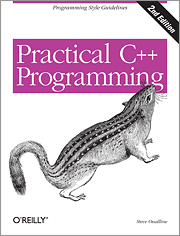
|
FreeComputerBooks.com
Links to Free Computer, Mathematics, Technical Books all over the World
|
|
- Title: Practical C++ Programming
- Author(s) Steve Oualline
- Publisher: O'Reilly Media; eBook (Online Editions)
- Paperback: 600 pages
- eBook: PDF
- Language: English
- ISBN-10: 0596004192
- ISBN-13: 978-0596004194
- Share This:

|
C++ is a powerful, highly flexible, and adaptable programming language that allows software engineers to organize and process information quickly and effectively. But this high-level language is relatively difficult to master, even if you already know the C programming language.
About the Authors- N/A
- The C++ Programming Language
- C Programming
- Unix/Linux Programming
- Computer and Video Game Development and Programming
- Computer Graphics Programming

- Practical C++ Programming (Steve Oualline)
- The Mirror Site (1) - PDF
- The Mirror Site (2) - PDF
- The Mirror Site (2) - PDF
-
 Modern C++ Tutorial: C++11/14/17/20 On the Fly (Changkun Ou)
Modern C++ Tutorial: C++11/14/17/20 On the Fly (Changkun Ou)
The book is intent to provide a comprehensive introduction to the relevant features regarding modern C++ (before 2020s). You should be aware that not all of these features are required. Instead, it should be learned when you really need it.
-
 The C++ Hackers Guide (Steve Oualline)
The C++ Hackers Guide (Steve Oualline)
This book collects more than 120 of the best C++ veteran secrets and puts them in one accessible place. The techniques presented have all been used in actual programs, and more importantly, have made actual programs better.
-
 Fundamentals of Programming C++ (Richard L. Halterman)
Fundamentals of Programming C++ (Richard L. Halterman)
This book teaches the basics of C++ programming in an easy-to-follow style, without assuming previous experience in any other language. It explains fundamental concepts and techniques in greater depth than traditional introductions.
-
 Object-Oriented Programming in C++, 4th Edition (Robert Lafore)
Object-Oriented Programming in C++, 4th Edition (Robert Lafore)
This book begins with the basic principles of the C++ programming language and systematically introduces increasingly advanced topics while illustrating the OOP methodology. It reflects the latest ANSI C++ standard and current practices.
-
 Pro TBB: C++ Parallel Programming with Threading Building Blocks
Pro TBB: C++ Parallel Programming with Threading Building Blocks
This book is a modern guide for all C++ programmers to learn Threading Building Blocks (TBB). It presents numerous examples and best practices to help you become an effective TBB programmer and leverage the power of parallel systems.
-
 Thinking in C++, Vol 1: Introduction to Standard C++ (2nd Edition)
Thinking in C++, Vol 1: Introduction to Standard C++ (2nd Edition)
Thinking in C++ by Bruce Eckel is the one C++ book you must have if you're doing serious development with C++. The book filled with expert advice and written in a patient, knowledgeable style.
-
 C++ in Action: Industrial Strength Programming Techniques
C++ in Action: Industrial Strength Programming Techniques
This is a modern guide to using C++ langugage, including how to apply it to Windows programming. Shows how to write programs for programmers, not computers. It teaches the programmer how to write small, fast, reliable, and scalable programs.
-
 Industrial Strength C++: Rules and Recommendations
Industrial Strength C++: Rules and Recommendations
This book presents proven strategies for using and programming in the C++ object-oriented language in the form of easy-to-follow lists of rules and recommendations. It covers naming conventions, code organization, resource management, etc.
-
 C++ Programming for Scientists (Roldan Pozo, et at)
C++ Programming for Scientists (Roldan Pozo, et at)
This book is designed specifically for today's Scientists, Engineers and Mathematicians with a wealth of new applications and examples taken from real situations involving electrical and structural engineering, fluid mechanics, mathematics, etc.
-
 Optimizing C++ (Steve Heller)
Optimizing C++ (Steve Heller)
This book offers several high-performance search and data-compression algorithms, which are all you need to add speed to C++. In some of the most useful sections of this book, the author looks at Huffman coding and dynamic hashing.
-
 Optimizing C++: A Book about Improving Program Performance
Optimizing C++: A Book about Improving Program Performance
This book contains guidelines and advices on how to write efficient software using the C++ language. Software correctness and maintainability are taken into account, but are not the primary concerns of the guidelines.





